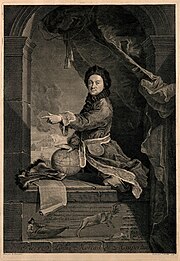Pierre Louis Moreau de Maupertuis
| Pierre Louis Maupertuis | |
|---|---|

Maupertuis, wearing "lapmudes"
from his Lapland expedition. |
|
| Born |
17 July 1698 Saint-Malo, France |
| Died | 27 July 1759 (aged 60) Basel, Switzerland |
| Nationality | French |
| Fields | Mathematics, physics, biology, metaphysic, moral philosophy, astronomy, geography |
| Institutions | French Academy, Berlin Academy |
| Known for | Principle of least action, precursor of transmutation |
| Influences | Leibniz, Newton, Descartes, Malebranche, Harvey, Berkeley |
| Influenced | Euler, Buffon, Diderot, Kant |
Pierre Louis Moreau de Maupertuis (French: [mopɛʁtɥi]; 1698 – 27 July 1759) was a French mathematician, philosopher and man of letters. He became the Director of the Académie des Sciences, and the first President of the Prussian Academy of Science, at the invitation of Frederick the Great.
Maupertuis made an expedition to Lapland to determine the shape of the Earth. He is often credited with having invented the principle of least action; a version is known as Maupertuis' principle – an integral equation that determines the path followed by a physical system. His work in natural history is interesting in relation to modern science, since he touched on aspects of heredity and the struggle for life.
Maupertuis was born at Saint-Malo, France, to a moderately wealthy family of merchant-corsairs. His father, Renė, had been involved in a number of enterprises that were central to the monarchy so that he thrived socially and politically. The son was educated in mathematics by a private tutor, Nicolas Guisnée, and upon completing his formal education his father secured him a largely honorific cavalry commission. After three years in the cavalry, during which time he became acquainted with fashionable social and mathematical circles, he moved to Paris and began building his reputation as a mathematician and literary wit. In 1723 he was admitted to the Académie des Sciences.
...
Wikipedia
